What Happens If I Dont Register A Canoe In Ohio
Ohio Canoeing
Laws & Regulations
Who needs the Ohio Boater Education Card?
All boaters born after December 31, 1981 must have an Ohio Boater Education Certificate to operate whatsoever motorized watercraft over x HP. BOATERexam.com® is a delegated provider for the Ohio Department of Natural Resources, Segmentation of Watercraft.
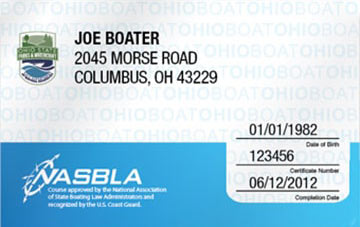
![]()
Approved by the
Ohio Department of Natural Resource, Partitioning of Watercraft

Good for life!
Get your official
Ohio Canoeing License
Ohio Canoeing Condom Requirements
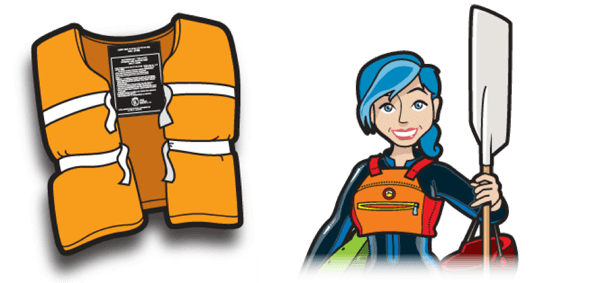
Personal Flotation Devices (PFDs aka Life Jackets)
- Ohio boaters are required to deport at least one U.South. Coast Baby-sit approved Type 4 PFD (ring beacon OR seat cushion) on all vessels that are 16 anxiety in length or greater, plus a wearable PFD for each person on lath.
- No person shall ride or endeavour to ride upon water skis, surfboards, inflatable devices or similar devices being towed by a vessel without wearing a U.S. Declension Guard approved Type I, II, or III PFD or a Type V PFD specifically designed for water-skiing, in good and serviceable condition, and of appropriate size. No operator of a vessel shall tow any person who fails to comply with this constabulary.
- All PWC operators and occupants must be wearing a Type I, II, Iii or Five personal flotation device.
- All vessels less than 16 feet in length too as canoes or kayaks of whatsoever length are required to take i Type I, Two or III wearable PFD per person.
- Inflatable PFDs are not intended for children nether the age of 16 years.
PFD Police for Children
All boaters or passengers younger than ten years of age onboard a vessel less than 18 anxiety in length must be wearing a U.South. Coast Guard approved PFD.
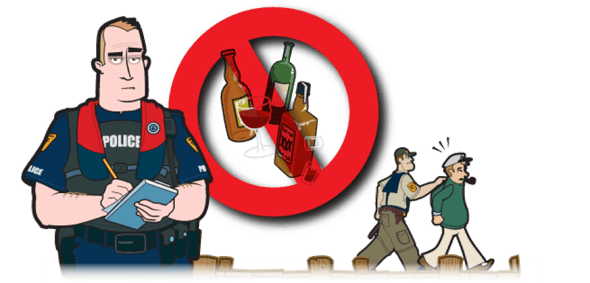
Alcohol & Boating Under the Influence (BUI)
A boat operator with a blood booze content (BAC) of .08% or more is considered to be intoxicated and operating under the influence (OUI). Ohio law establishes the post-obit penalties for boating while intoxicated:
| Penalty for Operating Under the Influence of Booze or Drugs | ||
|---|---|---|
| Offense | Minimum | Maximum |
| Start | 3 days jail; $150 fine | half dozen months in jail; $ane,000 fine |
| 2nd | 10 days jail; $150 fine | 6 months in jail; $1,000 fine |
| Third | 30 days jail; $150 fine | Up to 1 year in jail; $i,000 fine |
By operating a vessel on Ohio waters, you lot take consented to an booze test if asked by a law enforcement officer. Refusal to undergo testing is an offense in itself and may lead to a loss of operating privileges for upwardly to one yr as well as fines.
"Nil Tolerance" prohibits persons younger than 21 years of historic period from consuming alcohol and operating a vessel with any measurable alcohol level at or above 0.02%.

Ohio Boat Registration
The Ohio Department of Natural Resource, Partitioning of Watercraft regulates the state boating laws in Ohio.
Numbering and registering a watercraft are two separate functions. Boaters cannot operate whatsoever watercraft without a valid registration. Evidence of registration is shown by displaying 2 square tags or 1 rectangular tag (Culling Registration for watercraft propelled past homo muscular effort), and carrying the valid registration document on lath the watercraft.
All watercraft principally operated on Ohio waters must be registered and issued an Ohio Registration Certificate by the Ohio Division of Parks & Watercraft.
The following vessels do not require registration:
- Vessels which are not required to be numbered, excluding documented watercraft;
- Watercraft which are properly registered in some other state and operating the waters of Ohio for less than 60 days consecutively;
- Commercial vessels; and
- "Bellyboats"/"float tubes", kiteboards, paddleboards and sailboards.
New owners of a used watercraft must transfer the registration before operating the watercraft. To transfer the registration, only inquire the previous owner to complete the 'transfer' section and bring the registration document (even if not expired) to any watercraft registration agent. If a watercraft requiring a championship is transferred to a new possessor, the watercraft may be operated for up to 45 days earlier being titled in the new owner'south proper noun provided the new owner carries either of the following onboard:
- A temporary watercraft registration from an authorized registration agent; or
- A bill of sale from a watercraft dealer containing the required information.
*Registration Certificates and tags are valid for upward to 3 years and elapse on March 1st of the year indicated.
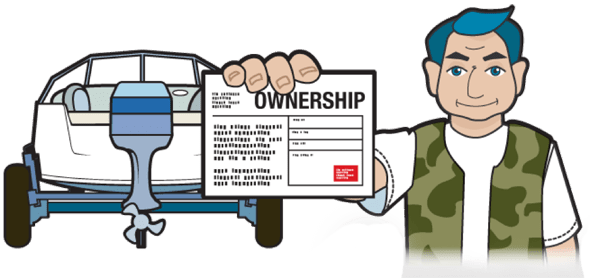
Certificate of Championship
Gunkhole owners must first obtain their boat championship before a certificate of registration can be issued. A gunkhole title is obtained from any county title office. The post-obit watercraft require a title in the state of Ohio:
- All watercraft fourteen feet or more in length; and
- All watercraft less than 14 feet in length, which are permanently fitted with a motor of 10 horsepower or more than.
Note: Outboard motors that are ten horsepower or more are also required to exist titled.
Some watercraft listed above and on the previous page may not take needed a title when it was originally purchased. Prior to selling the watercraft, withal, the owner must utilise to a title office and obtain a championship.
These include:
- Watercraft or outboards purchased on or earlier October ix, 1963; and
- Watercraft less than xiv feet in length with a permanently affixed mechanical means of propulsion of 10 horsepower or greater and purchased on or before Jan ane, 2000.
The following watercraft practise not require a Certificate of Title:
- U.Due south. Coast Guard documented watercraft
- Watercraft owned by federal, state or a political subdivision of a country
- Canoes and kayaks
- Motors which are less than 10 horsepower
- Watercraft from another country
- Watercraft less than 14 feet in length without a permanently affixed mechanical means of propulsion;
- Watercraft less than 14 feet in length with a permanently affixed mechanical means of propulsion of less than 10 horsepower; and
- A ship'southward life boat
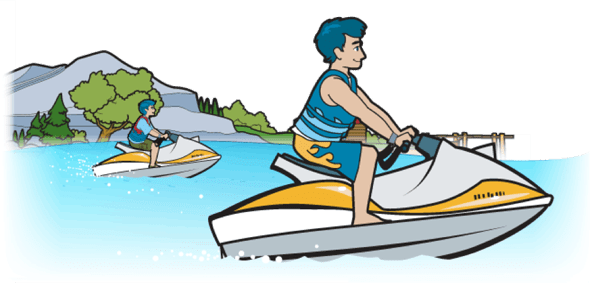
Personal Watercraft Laws & Regulations
Practice not underestimate a personal watercraft (PWC) – they are very powerful for their pocket-sized size and demand the same respect every bit whatever boat. In fact, PWC performance must adhere to the aforementioned rules and regulations as any other powerboat, including registration with the state and a B-1 class burn down extinguisher aboard. In that location are additional requirements in Ohio for PWC operation:
Hours of Functioning
No person shall operate a personal watercraft between dusk and sunrise.
Lanyard Requirementn
A person operating a personal watercraft that is equipped by the manufacturer with a lanyard-type engine cut-off switch, must attach the lanyard to the person, the person's habiliment, or personal flotation device as appropriate for the specific watercraft.
PFD Requirement
No person shall operate or permit the operation of a personal watercraft unless each person on the watercraft is wearing a Type I, Two, Three or V PFD at all times. Recall: Inflatable PFDs are NOT intended for use with PWC.
"No-wake" speed
PWC must operate at "no-wake" speed when in designated "no-wake" zones or shore zones.
No person who owns or has charge over a personal watercraft shall permit operation in violation of laws.
Boating on Lake Erie
Lake Erie is one of Ohio's most pop recreational boating locations. There are certain considerations when boating on Lake Erie that boaters must exist aware of.
Think to keep at least 100 yards from U.S. Naval vessels, which are occasionally found on the Great Lakes. You are as well required to reduce to "no wake" speed when operating within 500 yards of such vessels. If for whatsoever reason you need to approach inside 100 yards of a Naval vessel, y'all are required to contact either the vessel or the US coast guard before doing so, on aqueduct sixteen of your VHF-FM radio. Failure to do and then is a felony offence.
Lake Erie borders Canada. As such, boaters who cantankerous into Canadian waters must report for customs inspection. ALL boaters and passengers volition require a valid photo ID likewise every bit a passport or a birth certificate. For further information, telephone call Canadian Community at one-888-226-7277.
All boats entering the United States from Canadian waters that accept passengers who were on Canadian soil must report to U.S. Customs. This legal obligation may be met by phone. You tin can phone call on road with a cellular phone or immediately upon arrival to the United States.
Take the following information ready when calling to avoid delays:
- Boat registration number and length (and Customs decal if over thirty anxiety; run into below),
- Captain's proper name and appointment of birth,
- Total number of persons on lath and value of all purchases in Canada,
- The name of the marina where you first arrived on the Us side.U.Due south.
Customs and Border Protection has offices in Ashtabula (440-964-2510), Cleveland (440-891-3800), and Toledo/Sandusky (419-259-6424).
What Happens If I Dont Register A Canoe In Ohio,
Source: https://www.boaterexam.com/usa/ohio/regulations/
Posted by: freemanpinhould1981.blogspot.com


0 Response to "What Happens If I Dont Register A Canoe In Ohio"
Post a Comment